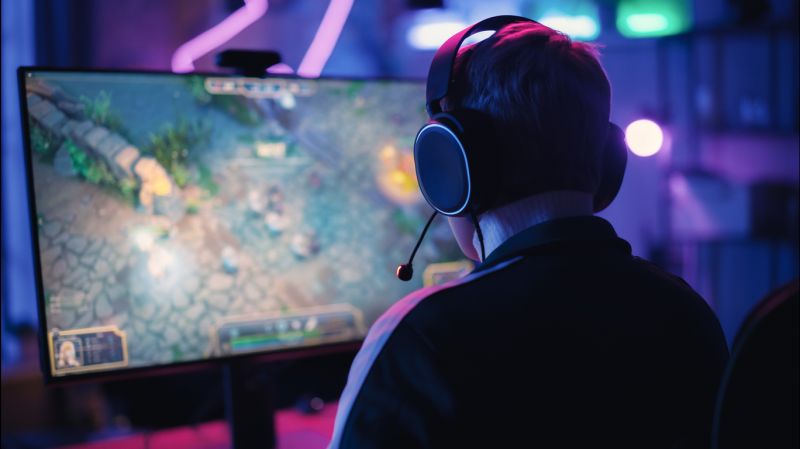How Video Games Shape Consumer Behaviour
Gaming transforms our engagement with brands. An expert explains how, and why marketers must be careful

Nearly 40 years after Mario popped out of his plumbing pipe and into our homes, video games have become a dominant part of today’s culture. And is there any wonder?
They immerse us in fantastic worlds, challenge us with “hard fun”, flood our brains with feel-good dopamine, and reward us for even the most incremental accomplishments. As one key character muses in Gabrielle Zevin’s smash 2022 novel Tomorrow, and Tomorrow, and Tomorrow — a book that centres around a trio of video game developers — they give us perpetual hope: “What is a game?” the character Marx says. “It’s tomorrow, and tomorrow, and tomorrow. It’s the possibility of infinite rebirth, infinite redemption. The idea that if you keep playing, you could win.”
From a consumer engagement standpoint, gaming behaviour offers a tantalizing blueprint — one that many marketers are pursuing with the vigour of a pixelated hero in a boss battle.
This phenomenon informs the work of Yulia Nevskaya, an assistant professor of marketing at Smith School of Business. Nevskaya studies how consumers respond to stimulation. Much of her research centres around the fascinating — and sometimes fraught — relationship between video games and marketing. Nevskaya spoke with Smith Business Insight contributor Deborah Aarts about why gaming is so powerful and the need for brands to harness it responsibly.
Let’s start with a question on behalf of 12-year-olds everywhere: How did you come to study video games for a living?
More than 10 years ago, I had a conversation with a friend of my husband in which we ended up speaking about video games for a long time, almost an hour. I wasn’t a gamer at all. From that conversation, I came to understand that he and I shared a world, but that he also had a separate world, an artificial environment with a totally different set of friends who were either not real or that he had never met in reality. Moreover, he spent a significant part of his life in that world. It made me think that video games were more powerful than I’d thought and that many people were involved with them very deeply. I thought, “Hmm, that’s interesting.”
A few other things were happening around this time. The technology was starting to become very powerful in terms of online connectivity and graphics, which also helped increase people’s involvement with video games. Then some data came my way. I started to think that maybe I should be studying why people were spending so much time gaming.
So, one day, I decided to play World of Warcraft, which was at the time the most popular massively multiplayer online video game. I logged in at about 7 p.m. Right away, I met another player’s avatar. We started travelling through these fascinating, beautiful landscapes, flying and chatting, and the next thing I knew, it was 4 a.m. I had spent nine hours playing without even realizing it.
This was the first time you’d ever played a video game?
Yes.
Wow.
Pretty quickly, my thought that I should maybe consider studying gaming became I should definitely do that. And so, I started a research project on habit formation and engagement with video games, and my work has grown from there.
What is it about games that suck people in so completely?
Games provide us with an easier and more wonderful world. In games, you can regenerate yourself. You can visit fascinating places you’ve never been in real life. You can fight monsters, which don’t exist. Video games provide fabulous entertainment, and they can definitely enrich your life in many ways.
Games are also very efficient at creating optimal experiences. In real life, we often don’t have a clear goal for ourselves. Even when we do, it can be really hard to map a plan for how to reach it. In a game, that’s all done for you. If there is a challenge in the game, the challenge is such that you can handle it. You can also see, relatively clearly, the path to reaching the goal. You know where to go, and you are rewarded for succeeding, step by step. These games create an optimal experience that puts people into a so-called state of flow, to use the term coined by Hungarian psychologist Mihaly Csikszentmihalyi. And they do it very, very efficiently.
What does the appeal of gaming teach us about consumer behaviour?
Video games confirm that people are very much responsive to rewards and that rewards don’t have to be tangible to be effective. None of the rewards in games are real. Gamers can spend hours working to, say, open a chest of gold. And yet people really respond to and value those intangible rewards.
We’re also starting to understand that people truly respond to praise and markers of success. That happens all the time in video games. When we open that chest of gold in the game, it is a mark of our success. It means something.
Marketers tend to overlook how valuable intangible rewards can be to people. Often, what we truly value is not something that we can touch or experience, but something that signifies that we can achieve things in life, or that we are successful. We shouldn’t underestimate the value and the power of that.
What can brands do to harness that power?
They can offer consumers praise. They can provide them ways to mark their success. They can show people how they are progressing. Fundamentally, they can give consumers reasons to be happy to engage. And the technology is now such that they can do it by gamifying a lot of products, such as loyalty and reward programs, and social media engagement.
As those of us who have lost entire weekends exploring the Kingdom of Hyrule know, video games can be addictive, and they get a lot of criticism for the negative consequences that can come from excessive play. Is the onus on marketers to gamify their campaigns responsibly?
I don’t study the ethics of gaming specifically. But I do think that we as marketers — and, more broadly, we as a society — should understand that we have developed very powerful engagement mechanisms. The algorithms that you face as a consumer in a gamified space — whether a video game or social media — are adaptable. They are personalized to you. They understand what you like and how you behave. That’s what leads to engagement, and then, sometimes, to engagement that is excessive.

What role does personal responsibility play here? Is it a company’s fault if a consumer gets hooked on a game or gets in too deep with a rewards program?
Many people think “Shouldn’t I be able to handle this? Isn’t it my personal responsibility to set time limits for myself and manage my engagement?” But I would like to underline that those algorithms are being thought through by teams of very smart individuals. It’s their job to create engaging algorithms personalized to you, and their capabilities have grown incredibly sophisticated, incredibly quickly. Most human beings do not yet know how to handle that. We just don’t have that much experience with it. So, as a society, we do have some decisions to make.
Does that mean we need to develop rules or a set of ethical guardrails?
Because video games — and social media, for that matter — are still relatively new, and because they are so powerful, they probably should be treated in a special way.
Here is an example of what that might look like. For decades, we in marketing have had rules and regulations intended to protect younger consumers, since a number of studies have shown that people are not able to recognize the commercial intent of certain content until about the age of 10. We could develop something similar for consumers of gamified content. But that kind of thing doesn’t happen fast.
Marketing is all about creating and communicating value to consumers. I like to think that I contribute to this area of study in a special way because I tend to structure my research around making this process more harmonious and thinking about how consumers could be better protected. Companies are producing and developing fantastic, sophisticated products, but they’re more powerful than any single human being’s resolve.
All these years after your World of Warcraft awakening, how much time do you spend gaming now?
I tend not to play at all, actually. I certainly don’t consider myself a gamer. It takes too much time, and that can become an issue for me. So, I intentionally stay away.